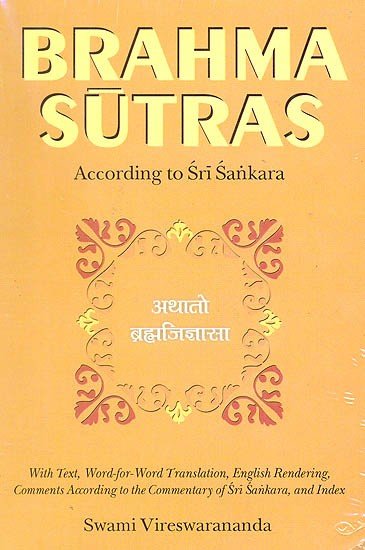Brahma Sutras (Shankara Bhashya)
by Swami Vireshwarananda | 1936 | 124,571 words | ISBN-10: 8175050063
This is the English translation of the Brahma-sutras including the commentary (Bhashya) of Shankara. The Brahma-sutra (or, Vedanta-sutra) is one of the three canonical texts of the Vedanta school of Hindu philosophy and represents an early exposition the Vedantic interpretation of the Upanishads. This edition has the original Sanskrit text, the r...
Chapter IV, Section I, Adhikarana XII
Adhikarana summary: Obligatory works are however excepted from the rule mentioned in topic 10
Sutra 4,1.16
अग्निहोत्रादि तु तत्कार्यायैव, तद्दर्शनात् ॥ १६ ॥
agnihotrādi tu tatkāryāyaiva, taddarśanāt || 16 ||
agnihotrādi—(Daily) Agnihotra etc.; tu—but; tat-kāryāya—contribute to the same result as that (Knowledge); eva—only; tat-darśanāt—that being seen (from the scriptures).
16. But (the results of daily) Agnihotra etc. (are not destroyed by Knowledge; these) contribute to the very same result as Knowledge (i.e. Liberation), because that is seen from the scriptures.
Among works some are enjoined for attaining certain results such as heaven, and there are others like the daily Agnihotra which yield no such results and yet are enjoined as a sort of discipline. The opponent holds that even these regular works (Nitya Karma) performed before the dawning of Knowledge are destroyed, even as works done with desires (Kamya Karma), for from the standpoint of the knower of Brahman his non-agency with respect to both is the same. This Sutra refutes that view and says that the regular works performed in the past are not destroyed. Works are of two kinds : those which yield specific results, and those which help to produce Knowledge. Obligatory regular works performed before Knowledge are of this latter kind. And since Knowledge leads to Liberation, the regular works also may be said to contribute indirectly to that. Hence their results persist till death.
Sutra 4,1.17
अतो’न्यापि ह्येकेषामुभयोः ॥ १७ ॥
ato’nyāpi hyekeṣāmubhayoḥ || 17 ||
ataḥ—From this; anya—different; api—also; hi—indeed; ekeṣām—of some (Sakhas); ubhayoḥ—of both.
17. (There are) indeed (good works) also different from this (daily Agnihotra and the like), (with reference to which is the statement) of some (Sakhas); (this is the view) of both (Jaimini and Badarayana).
Besides the Nitya Karma or regular works like the daily Agnihotra and the like there are other good works which are performed with a view to certain results. It is with reference to these that the following statement of some Sakhas is made: “His sons get his inheritance—friends his good works and enemies his evil actions.” Both Jaimini and Badarayana are of opinion that works done with a desire do not help the origination of Knowledge.
